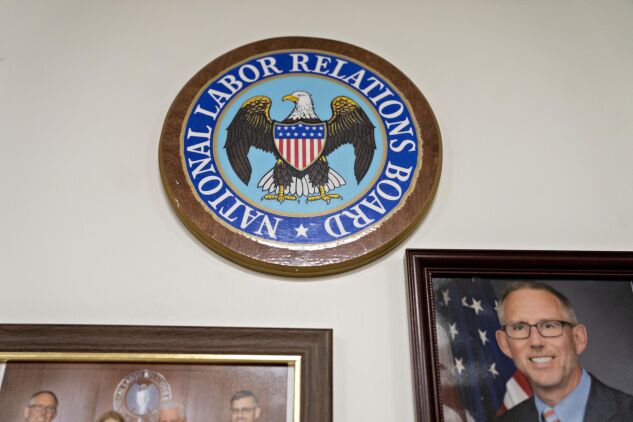Monday Morning Musings for Workplace Watchers
Contractor Compliance Conference Canceled | Arbitration’s Newest Rules
Rebecca Klar: For the first time in more than 40 years, hundreds of attorneys and federal contractors won’t meet this week for the National Industry Liaison Group’s annual conference. Because for the first time in decades the industry’s discrimination watchdog office has been slashed.
The NILG’s conference, set to be held in National Harbor in Maryland, will no longer take place due to President Donald Trump’s rescission of EO 11246.
That executive order established most of the purview of the US Department of Labor’s Office of Federal Contract Compliance Programs. The conference is centered on helping the thousands of companies that do business with government follow equal employment opportunity law requirements set out for them.
NILG Board Chair Julie O’Hara-Harvey said in an email the annual conference is a “significant undertaking,” and Trump’s rescission of EO 11246 left “several unknowns.”
Striking down EO 11246 kicked off a series of actions unraveling the OFCCP altogether. The White House budget slated the OFCCP for a shutdown at the end of the fiscal year. And almost all of the agency’s staff have been fired, although those plans have been paused due to court action challenging government-wide layoffs.
Many conference session topics were “no longer relevant” and it wasn’t clear if agency leadership would attend, O’Hara-Harvey said.
“Most importantly, the NILG leadership needed to focus on meeting the needs of our members at that moment,” she added.
The first Industry Liaison Group Conference was held in 1983 in New Orleans, predating the formation of the national group in 1992.
That year, former OFCCP Director Ellen Shong-Bergman created the idea for an annual conference, which led to a partnership with the OFCCP and federal contractor community to establish an ILG group in each region, O’Hara-Harvey said. The group expanded over the years to include partnerships with other federal agencies, including the Equal Employment Opportunity Commission and disability and veterans’ offices within DOL.
The event brought together roughly 600 attendees each year, a group which included contractor representatives, attorneys, consultants, and agency representatives.
“It was almost like a reunion,” said Craig Leen, OFCCP director during the first Trump administration. “All of us getting together once a year and celebrating equal opportunity in employment, compliance with the law, and making sure you had an inclusive workplace where everybody wanted to be.”
Leen said he’s sad the conference isn’t happening this year, but understands the board’s decision.
“I’m sure they will come forward with other opportunities to get together and meet soon,” he added.
In 2020, the conference was shifted to a virtual format, because of the Covid-19 pandemic. But even then, it continued.
The board’s decision to cancel the conference “was not an easy one,” O’Hara-Harvey said.
But she said this isn’t the end of the NILG conference for good.
“Despite present challenges, the need remains and so we are adapting and evolving to the new environment, just like we have done for decades,” O’Hara-Harvey said.
Khorri Atkinson: New rules from one of the country’s largest private dispute resolution providers affecting how parties exchange evidence and whether an issue falls within the scope of an arbitration agreement continue to raise concerns among plaintiff attorneys.
The American Arbitration Association recently adopted sweeping changes to its employment arbitration rules and mediation procedures, including discovery standards that grant arbitrators broad discretion over the scope of information exchange. The party seeking documents must now “reasonably” believe they “exist and are relevant and material to the outcome of disputed issues,” a requirement attorneys say is higher than what federal court rules demand in litigation.
The Federal Rules of Civil Procedure permits parties to seek records “relevant to any party’s claim or defense,” but has no requirement for a party to demonstrate that the sought-for discovery is “material” to the outcome of disputed issues, said Katz Banks Kumin LLP partner Hugh Baran.
“What will ultimately happen is you’re going to get into objections and fights over whether the party’s belief that a document exists is reasonable or whether it’s material or relevant, even before the responding party is obligated to say if a responsive document exists or not,” he said.
“That seems very contrary to the whole stated purpose of the rules of promoting efficiency,” and it undermines private dispute resolution’s goal of offering a less costly and quicker way to resolve disputes, Baran said.
Under the new rules, arbitrators now have broader authority to decide whether a case should be arbitrated, even when the validity or applicability of an arbitration clause is in question.
This approach diverges from long-standing legal norms that typically reserve questions of arbitrability for courts, especially when workers challenge the existence or enforceability of an arbitration clause, attorneys said.
It means that “a party who signed an arbitration agreement that incorporated AAA rules is effectively bound by this delegation provision,” said Troy L. Kessler, co-founder of Kessler Matura PC.
This conflicts with the US Supreme Court’s 1995 First Options of Chicago Inc. v. Kaplan decision that courts should decide whether a dispute is arbitrable unless there is “clear and unmistakable” he said.
The AAA didn’t respond to a request to comment further on the changes. It previously said the new rules aimed to maintain fairness, efficiency, and transparency in its arbitration processes.
We’re punching out. Daily Labor Report subscribers please check in for updates during the week, and feel free to reach out to us.
To contact the reporters on this story:
To contact the editors responsible for this story:
Learn more about Bloomberg Law or Log In to keep reading:
See Breaking News in Context
Bloomberg Law provides trusted coverage of current events enhanced with legal analysis.
Already a subscriber?
Log in to keep reading or access research tools and resources.


